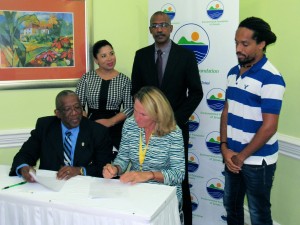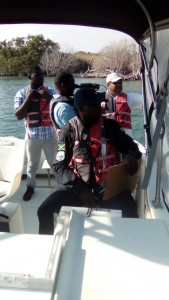
Tackling Climate Change on Several Fronts
March 1st, 2017
Despite what the new President of the United States says, climate change is real. It is with us, here and now. I believe developing countries such as ours have fully acknowledged this fact (as well as ninety-something per cent of scientists). After all, we are already feeling the effects. Jamaicans may not look at regular (and longer) droughts and unusually warm spring days (don’t our days seem very warm, already?) and say “Ah yes, that’s climate change.” There is no doubt, however, that many of us are fully aware of the trends – trends that are here to stay. We can see it in our own front yards – at least, I can. What was once our lush green lawn is now patched with dusty areas, where grass no longer grows. Certain plants that we used to grow in our garden now wilt in the heat and disappear, even with regular watering. You see, it is gradually getting hotter. Now, we should understand that climate change doesn’t happen overnight. But it’s happening, and it has been creeping up on us for years.

C-CAM’s Field Office in Salt River, Clarendon – often frequented by the endangered and protected American Crocodile! (My photo)
Nevertheless, we are not throwing in the towel. Not just yet. As we see and experience these changes, wherever we are, we are adapting – almost subconsciously. Farmers are seeking more efficient ways to grow their crops, using less water; homes and small enterprises are using rainwater harvesting. Those black water tanks, although not aesthetically pleasing, are proliferating on rooftops and in back yards. Construction companies are looking at more sustainable ways to build – more insulation against the heat, for example, in windows and roofs. And all the time, people are looking at creative ways to solve a problem and make money out of it. One example is young social entrepreneur/inventer Jovan Evans, whose company AquaFlow offers devices for drinking, taking showers and washing hands that connect to small water sources and do not require electricity, helping water-deprived communities. Jovan is an example of the Green Economy – with social benefits – that I hope we are working towards (although, in my opinion, not fast enough).

The White River Marine Association’s grant, being signed here with Professor Dale Webber, Chair of the EFJ, is in support of coral reef restoration – part of a five-year plan with the support of local fishermen, nearby hotels and the Oracabessa Foundation. (My photo)
Several initiatives are currently helping to bolster Jamaica’s climate change resilience. “It takes cash to care,” as someone famously said. Now the Environmental Foundation of Jamaica (EFJ), which has already disbursed close to J$75 million in grants, has just entered the second round with a Call for Proposals for non-governmental and community-based organisations, as well as civil society groups to apply for grants of up to J$5 million each. The grants are made available, in collaboration with the Ministry of Economic Growth and Job Creation, through the Inter-American Development Bank’s (IDB) Special Climate Change Adaptation Fund (SCCAF). In the first round, 18 organisations received grants to establish climate-smart agricultural projects such as greenhouse farming and aquaponics; to build water management systems in water-scarce rural areas; to establish school gardens and a juice processing plant – to name just a few projects. Climate change adaptation often means doing more with less, and abandoning wasteful practices. These projects will not only help preserve precious natural resources, but will also provide employment and sustainable livelihoods for Jamaicans in areas where opportunities are few, and dwindling. You can find full details here.

C-CAM’s Scientific Officer D. Brandon Hay took a patrol boat around the Portland Bight Protected Area last week, with CVM Television on board. (Photo: C-CAM/Facebook)
The Mayor of May Pen, Winston Maragh, moved from one climate change issue to another last week, when he arrived at the Field Office of the Caribbean Coastal Area Management Foundation (C-CAM) in Salt River somewhat late from a lengthy meeting in his town. What was the meeting about? It was to discuss ways of “finding water.” Yes, finding water. Mayor Maragh says he is trying to identify new sources of what media houses call “the precious commodity” for the parish of Clarendon, which continues to suffer from regular and lengthy droughts. The event the Mayor attended at C-CAM was another major boost for the fight: a grant signing with the Belize-based Caribbean Community Climate Change Centre (“Five C’s”) in support of efforts to conserve the environment in the Portland Bight Protected Area. The grant is under the Coastal Protection for Climate Change Adaptation in the Small Island States in the Caribbean (CPCCA) Project. Quite a mouthful! It is one of four such projects to benefit specific organisations in Jamaica. Not only the environment, but the human beings who depend on it are at risk. This area of mangrove, salt marsh and dry limestone forest is particularly vulnerable, and the fisherfolk are especially stressed by the impact of higher ocean temperatures, degraded coral reefs and other factors. Unsustainable charcoal burning also takes place in the area.
I mentioned earlier that Jamaicans may not readily “see” problems that arise as climate change-related. Be that as it may, as Principal Director of the Climate Change Division at the Ministry of Economic Growth and Job Creation Una May Gordon noted last week, “Climate change is everybody’s business,” whether we recognise it or not. Bob Dylan sang many years ago, “The times they are a-changin'” – and they are changing much more rapidly now. We will need every bit of ingenuity we can muster. We will need collective action (“we must organise ourselves,” Ms. Gordon stressed), focus, patience and hard work to confront the challenges ahead.
Strong leadership is also required in the years ahead. Prime Minister Andrew Holness was the first Jamaican Prime Minister to attend a “COP” (Conference of Parties) meeting – the huge annual UN Climate Change Conference – which took place last year in Marrakech, Morocco. This may seem symbolic, but it is more. We need to show this kind of commitment at the political leadership level – as well as in our own lives.
Climate change is, indeed, everybody’s business.
Tags: adaptation, agriculture, Andrew Holness, aquaponics, C-CAM, Caribbean, Caribbean Coastal Area Management Foundation, Caribbean Community Climate Change Centre, Clarendon, Climate Change, climate change adaptation, Climate Change Division, climate-smart agriculture, COP, drought, Environmental Foundation of Jamaica, fisheries, green building, green economy, greenhouse, IDB, Inter-American Development Bank, Jamaica, Jovan Evans, mangrove, Marrakech, May Pen, Mayor of May Pen, Ministry of Economic Growth and Job Creation, NGO, Portland Bight Protected Area, Prime Minister, rainwater harvesting, Salt River, Small Island Developing States, social entrepreneur, sustainable development, Una May Gordon, water, water resource management, Winston Maragh
The Gleaner reserves the right not to publish comments that may be deemed libelous, derogatory or indecent.
To respond to The Gleaner please use the feedback form.
One Response to “Tackling Climate Change on Several Fronts”
- We Are the Zoomers
- Living Online with Humans and Birds: NAOC 2020
- Human Trafficking and the Problem of Public Education
- Down Memory Lane
- Are We Ready to Recover from COVID-19?
- Road Safety Matters: Is Your Vehicle Safe?
- Sexual Harassment, Me Too, and the Minister’s Disturbing Giggle
- The Vulnerable Senior Citizens, Private Care Homes and COVID-19
- A Muddle Over Masks
- Here is Something Life-Saving You Can Do: Give Blood!



[…] with the agreement with the Caribbean Coastal Area Management Foundation, which I wrote about recently, the Caribbean Community Climate Change Centre (CCCCC) is implementing its Coastal Protection for […]